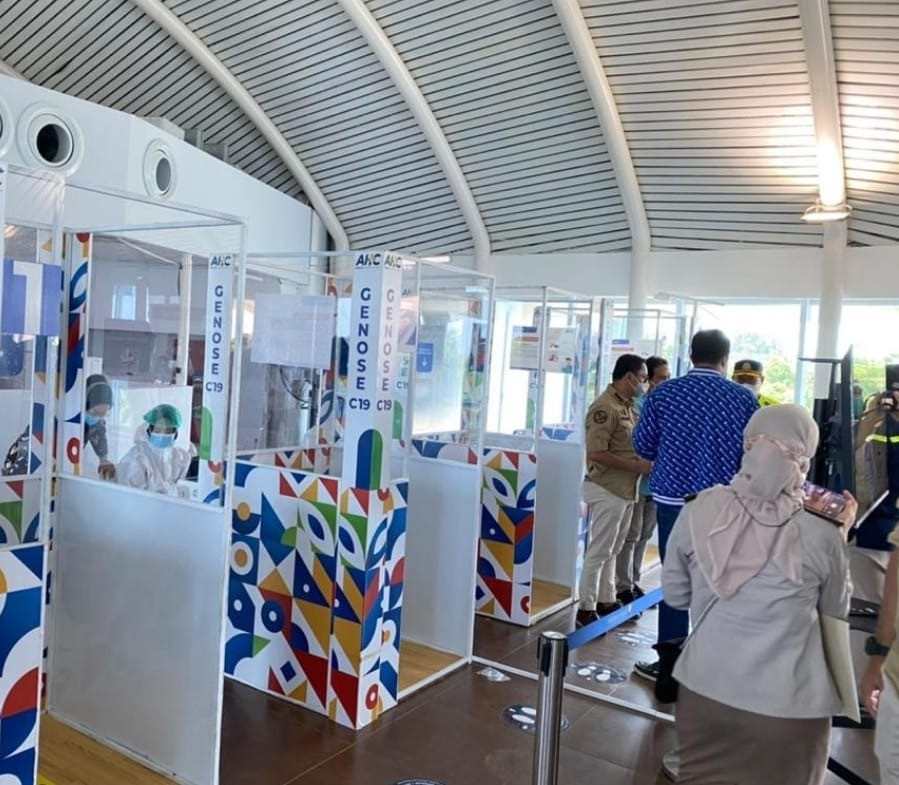Questions linger over COVID-19 breathalyzer
GeNose tool uses sensory system to detect organic compounds
Change Size

G
eNose, a coronavirus breathalyzer invented by Gadjah Mada University (UGM), is getting more and more widely used for traveling, tourism and other public activities, like going to the movies, because it is cheaper and offers faster results than the gold standard polymerase chain reaction (PCR) test. But doubts still linger over its accuracy because of a lack of transparency in its development.
GeNose was developed by UGM associate professor of physics Kuwat Triyana and UGM pediatric clinician Dian Kesumapramudya Nurputra. It is based on an artificial-intelligence-powered sensory system that mimics the human nose to detect volatile organic compounds, which, according to its researchers, are specific to people with COVID-19, exhaled by a person into a plastic bag.
UGM researchers discovered the unique composition exhaled by COVID-19 patients after comparing breath samples of more than 600 people from April to August last year, about half of whom were coronavirus-positive at the time.
They then carried out diagnostic trials from October to December by comparing GeNose’s results with those of PCR tests, the gold standard for COVID-19 testing. The trials looked into 2,500 breath samples from 1,476 suspected COVID-19 outpatients at seven hospitals, as well as 523 office workers who were randomly sampled upon request from the Health Ministry’s independent reviewer team.
The UGM team found that GeNose had a sensitivity of 89-92 percent and specificity of 95-96 percent compared to PCR -- meaning that out of 100 people detected negative by GeNose, eight to 11 people could test positive using the PCR method, or false negatives. Meanwhile, out of 100 positives, four to five people might test negative using the PCR test, or false positives.
Costing US$0.7 to $1.7, GeNose tests are much cheaper than PCR and conventional rapid tests, and they can produce results in three minutes. But people must fast and not smoke for at least 30 to 60 minutes before breath sampling, while environmental factors, such as air saturation, can affect the results.
During Ramadan, people who are fasting are advised to take the test at least six hours after pre-dawn meals to anticipate gastric acid affecting the gas they exhale.
There has been no peer-reviewed publication of the trials.
The first paper on the GeNose mechanism had recently been submitted for review after the UGM team had received a patent from the government, Dian said, without revealing which publication it was. The team is working on a second paper on the diagnostic trial results, which it expects to submit in May.
Dian said he was aware of criticism regarding the lack of publication but said the trials had complied with procedures and had gone through evaluation by experts outside UGM before receiving the Health Ministry’s emergency marketing authorization last December.
There is, however, a dilemma for researchers like Dian, who said that, while he would like to have gone through the common route of publication before implementation, that might have taken at least a year and the pandemic necessitated swift action.
“I’ve said several times that we could [use] it later, we didn’t need to rush in releasing it, but we couldn’t because there’s pressure from above for it to be used soon,” he said, later on referring to the public as what he meant by “above”.
At least three universities, the University of Indonesia, Airlangga University and Andalas University, have been appointed to run independent validation trials on GeNose -- all are still in the early stages. Dian said validation trials had also been carried out in several hospitals -- the results of which would be announced once analyzed.
Read also: UGM receives orders for GeNose detector
Biomedical scientist Ahmad Utomo at Yarsi University suggested the wide use of GeNose be suspended until independent validation trials from other universities and hospitals showed promising results. He said publications on GeNose trials should have been out by now, at least in the form of preprints, to ensure transparency on trials procedures, subjects and data.
He said the use of GeNose at public transportation hubs should be integrated into diagnostic trials, meaning that passengers should also be tested with the PCR method for comparison, otherwise it might jeopardize containment efforts. “Authorities have authorized its use, so now it’s their responsibility to continue monitoring it.”
The government introduced GeNose as a method for screening passengers at several train stations and bus terminals across Jakarta in February. The kit soon gained popularity among passengers due to the low price of the test and noninvasive method.
Earlier this month, the government started using GeNose at Tanjung Priok Port in North Jakarta and I Gusti Ngurah Rai International Airport in Bali. The government plans to use it also at Soekarno-Hatta International Airport in May, while Tourism and Creative Economy Minister Sandiaga Uno said recently that he aimed to offer it at several tourist spots across Bali.









